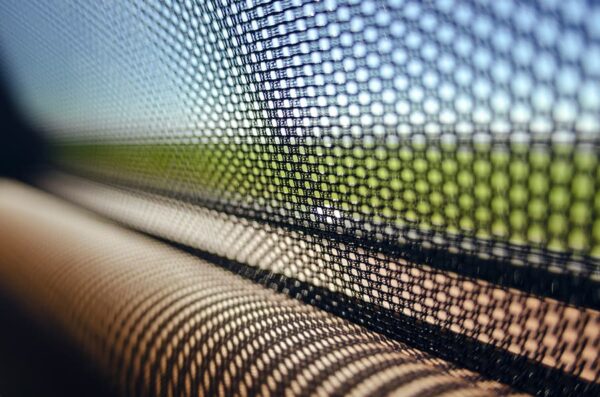When it comes to shade tarps, one of the most asked questions is whether they are UV-resistant. Well, this article is here to discuss precisely that. We discuss mesh tarps’ UV resistance as well as some of the top applications of mesh tarps.
Mesh tarps are generally UV resistant but don’t block 100% UV rays. That’s because it is not a super material. It is designed to let a particular amount of UV rays. So it will unlikely block 100% of UV rays.
Of course, you will be okay if you plan to spend half the day outside, and most of it will be under a mesh tarp. With that said, let’s discuss mesh tarps and their uses.
What is a mesh tarp?
Large, mesh-covered canopies are known as mesh tarps. These frequently permit up to 45% of UV radiation from sunshine to pass through and are not waterproof. Mesh tarps are less expensive than other tarp styles and materials, but they are useful in various situations.
As you may have noticed, while following a dump truck on the highway, materials are frequently secured with a mesh tarp in the construction industry to keep them from shifting while being transported.
Mesh tarps help build your own backyard canopies since they may offer a good amount of shade and reduce temperatures by up to ten degrees.
What is the best material for mesh tarps?
Although “mesh” would be the most straightforward answer, it doesn’t fully capture it. Most mesh tarps are made of polyethylene strands that have been cut into pieces that resemble fabric and are usually stitched together. A mesh canopy is created by stacking these polyethylene strips on top of one another.
Because you can put more pressure on poly mesh tarps than cotton canvas mesh tarps, they are better. Do not misunderstand; cotton is wonderful, but a poly tarp can withstand far more pressure than cotton.
Silver poly tarp
Silver tarps are extremely durable and excellent sun blockers. All our heavy-duty poly tarps are UV protected, but the silver coating we apply to them gives them a shiny, reflective finish. The reflective material can be placed on both sides of the silver/silver tarps, which are silver on both sides.
The black and silver tarps are black on one side and silver on the other. Due to the silver reflecting material on one side of the tarp and the black-out material on the other, the black side of the tarp serves as a light inhibitor, blocking out light better than other tarps.
Along with being waterproof, strong, tear-resistant, and mildew-resistant, silver and poly tarps also offer UV resistance.
Because mesh tarps are durable, waterproof, and UV resistant, this makes them have an array of uses. Here are the most common uses of mesh tarps:
- They can be used to protect raised garden beds
It’s wonderful if you have a raised garden bed, but it’s probably because you live in a region where the scorching heat typically kills plants. Your plants can still receive sunshine, but you can’t let them wither and burn in the heat.
Mesh tarps offer that protection, and if you can, you may arrange it so that it just drops off a few hooks when you need the sunlight and rises again when you need to cover your plants. It’s an effective remedy.
- Used in agricultural facilities
Because they let some moisture and sunlight through, these tarps are frequently used in agricultural labor. That’s not like a polyethylene tarp, which is useful for protecting vegetation from heat and rain.
Mesh tarps can be used for many different things, including mushroom cultivation, greenhouses, preserving plant life in bad weather, and much more. It truly is astounding when you consider how the mesh is used to grow and safeguard the fruits and vegetables we consume every day.
- Canopy for events
Using mesh tarps as shade is likely to be the most typical topic you encounter. That’s thanks to the sun protection they offer. Several different types of tarp can be used to create canopies; mesh tarp is a particularly well-liked material. It can be mounted on poles or integrated into the edge of your roof, is less expensive, and takes less time to set up than a valance tarp. This can be used as a simple shade structure in the garden, as a tent cover for a camping trip, a festival on the street, or even a wedding reception you’re throwing. There is usually a reason to use the mesh tarp when you are working outdoors.
How strong are mesh tarps?
Depending on what you’re discussing, yes. Not much, if you’re wondering how much rainfall it could store. Even though moisture is permitted to pass through, if rainwater were to collect within a mesh tarp, it would eventually buckle at its weakest spot.
For example, they are not strong enough to transport things in the back of a pickup truck. If they move about too much, materials would cut through them, and utilizing them, for this reason, would definitely significantly reduce their lifespan.
Mesh tarps work best when used to cover materials from the top down rather than transporting them. Mesh tarps could be used at a yard sale to hang onto a pile of objects without breaking and carry a little amount of weight for debris and abandoned materials during a repair project.
Mesh tarps can only withstand so much before they start to fail, so don’t abuse them. They aren’t less beneficial, but you have to use them in the appropriate circumstances to make the most of them, which is why they are a less expensive tarp alternative.

